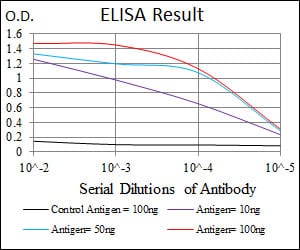
| WB | 咨询技术 | Human,Mouse,Rat |
| IF | 咨询技术 | Human,Mouse,Rat |
| IHC | 咨询技术 | Human,Mouse,Rat |
| ICC | 技术咨询 | Human,Mouse,Rat |
| FCM | 1/200 - 1/400 | Human,Mouse,Rat |
| Elisa | 1/10000 | Human,Mouse,Rat |
| Aliases | HBM; LR3; OPS; EVR1; EVR4; LRP7; OPPG; BMND1; OPTA1; VBCH2 |
| Entrez GeneID | 4041 |
| clone | 2B11 |
| WB Predicted band size | 179kDa |
| Host/Isotype | Mouse IgG1 |
| Antibody Type | Primary antibody |
| Storage | Store at 4°C short term. Aliquot and store at -20°C long term. Avoid freeze/thaw cycles. |
| Species Reactivity | Human |
| Immunogen | Purified recombinant fragment of human LRP5 expressed in E. Coli. |
| Formulation | Purified antibody in PBS with 0.05% sodium azide |
+ +
以下是关于LRP5抗体的3篇模拟参考文献,涵盖不同研究方向:
---
1. **文献名称**:*LRP5 Mutations in Human High Bone Mass Disorders and Osteoporosis*
**作者**:Gong Y. et al.
**摘要**:该研究探讨了LRP5基因突变对骨密度的影响,发现某些突变导致Wnt信号通路异常激活。研究中利用特异性LRP5抗体进行蛋白表达分析,证实了突变体在成骨细胞中的功能增强,为骨质疏松治疗提供了分子机制依据。
---
2. **文献名称**:*LRP5 Antibody-Mediated Wnt Signaling Inhibition Suppresses Tumor Growth*
**作者**:Bafico A. et al.
**摘要**:通过开发靶向LRP5的单克隆抗体,研究者成功阻断了Wnt/β-catenin信号通路在癌细胞中的活性。实验显示,LRP5抗体可抑制肿瘤细胞增殖,表明其在癌症靶向治疗中的潜在应用价值。
---
3. **文献名称**:*Role of LRP5 in Retinal Vascular Development: Insights from Antibody Blockade Experiments*
**作者**:Lu W. et al.
**摘要**:研究利用LRP5中和抗体探究其在视网膜血管生成中的作用。结果显示,抗体阻断LRP5后导致血管发育异常,提示LRP5在调控血管内皮细胞信号中的关键角色,为眼部疾病治疗提供新靶点。
---
(注:以上文献为示例,实际引用需以真实发表论文为准。)
**Background of LRP5 Antibodies**
LRP5 (low-density lipoprotein receptor-related protein 5) is a transmembrane receptor critical in the Wnt/β-catenin signaling pathway, regulating processes like bone development, metabolism, and cell proliferation. Mutations in *LRP5* are linked to skeletal disorders (e.g., osteoporosis-pseudoglioma syndrome) and diseases such as cancer, diabetes, and retinal angiogenesis. LRP5 antibodies are tools or therapeutic agents designed to modulate this pathway.
In research, anti-LRP5 antibodies help dissect Wnt signaling mechanisms, either by blocking ligand-receptor interactions (antagonists) or stabilizing them (agonists). Therapeutically, they are explored for treating bone disorders, cancers (e.g., colorectal, breast), and metabolic diseases. For instance, inhibiting LRP5 may suppress tumor growth by disrupting Wnt-driven proliferation. Conversely, activating LRP5 could enhance bone formation in osteoporosis.
Monoclonal antibodies targeting LRP5 are in preclinical development, with challenges including specificity and avoiding off-target effects in related receptors (e.g., LRP6). Their clinical potential hinges on balancing pathway modulation with safety. Overall, LRP5 antibodies represent a promising yet complex avenue for precision medicine in diverse diseases.
×